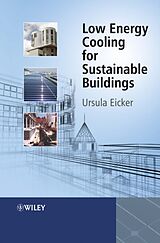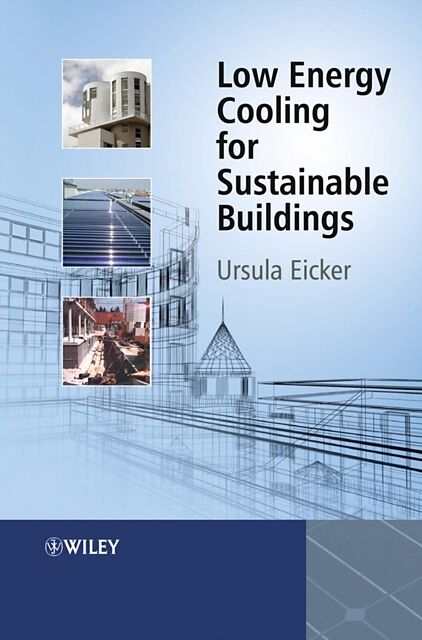Low Energy Cooling for Sustainable Buildings
Einband:
Fester Einband
EAN:
9780470697443
Untertitel:
Englisch
Genre:
Elektrotechnik
Autor:
Ursula Eicker
Herausgeber:
Wiley
Auflage:
1. Auflage
Anzahl Seiten:
276
Erscheinungsdatum:
27.03.2009
ISBN:
978-0-470-69744-3
Informationen zum Autor Ursula Eicker is a physicist who carries out international research projects on solar cooling, heating, electricity production and building energy efficiency at the University of Applied Sciences in Stuttgart. She obtained her PhD in amorphous silicon thin-film solar cells from Heriot-Watt University in Edinburgh and then worked on the process development of large-scale amorphous silicon modules in France. She continued her research in photovoltaic system technology at the Centre for Solar Energy and Hydrogen Research in Stuttgart. She set up the Solar Energy and Building Physics Research Group in Stuttgart in 1993. Her current research emphasis is on the development and implementation of active solar thermal cooling technologies, low-energy buildings and sustainable communities, control strategies and simulation technology, heat transfer in fac¸ades, etc. Since 2002 she has been the scientific director of the research centre on sustainable energy technologies (zafh.net) in BadenW¨urttemberg. She also heads the Institute of Applied Research of the University of Applied Sciences in Stuttgart, where building physicists, geoinformation scientists, mathematicians, civil engineers and architects cooperate. During the last 10 years Professor Eicker has coordinated numerous research projects on sustainable communities with renewable energy systems and highly efficient buildings. The largest projects include the European Integrated POLYCITY Project, a demonstration project on sustainable buildings and systems in Germany, Italy and Spain, and the European PhD school CITYNET on information system design for sustainable communities. Klappentext This long-awaited reference guide provides a complete overview of low energy cooling systems for buildings, covering a wide range of existing and emerging sustainable energy technologies in one comprehensive volume. An excellent data source on cooling performance, such as building loads or solar thermal chiller efficiencies, it is essential reading for building services and renewable energy engineers and researchers covering sustainable design.The book is unique in including a large set of experimental results from years of monitoring actual building and energy plants, as well as detailed laboratory and simulation analyses. These demonstrate which systems really work in buildings, what the real costs are and how operation can be optimized - crucial information for planners, builders and architects to gain confidence in applying new technologies in the building sector.Inside you will find valuable insights into:* the energy demand of residential and office buildings;* facades and summer performance of buildings;* passive cooling strategies;* geothermal cooling;* active thermal cooling technologies, including absorption cooling, desiccant cooling and new developments in low power chillers;* sustainable building operation using simulation.Supporting case study material makes this a useful text for senior undergraduate students on renewable and sustainable energy courses. Practical and informative, it is the best up-to-date volume on the important and rapidly growing area of cooling. Zusammenfassung This long-awaited reference guide provides a complete overview of low energy cooling systems for buildings, covering a wide range of existing and emerging sustainable energy technologies in one comprehensive volume. An excellent data source on cooling performance, such as building loads or solar thermal chiller efficiencies, it is essential reading for building services and renewable energy engineers and researchers covering sustainable design.The book is unique in including a large set of experimental results from years of monitoring actual building and energy plants, as well as detailed laboratory and simulation analyses. These demonstrate which systems really work in buildings, what the real costs are and how operation can be optimized...
Autorentext
Ursula Eicker is a physicist who carries out international research projects on solar cooling, heating, electricity production and building energy efficiency at the University of Applied Sciences in Stuttgart. She obtained her PhD in amorphous silicon thin-film solar cells from Heriot-Watt University in Edinburgh and then worked on the process development of large-scale amorphous silicon modules in France. She continued her research in photovoltaic system technology at the Centre for Solar Energy and Hydrogen Research in Stuttgart. She set up the Solar Energy and Building Physics Research Group in Stuttgart in 1993. Her current research emphasis is on the development and implementation of active solar thermal cooling technologies, low-energy buildings and sustainable communities, control strategies and simulation technology, heat transfer in fac¸ades, etc. Since 2002 she has been the scientific director of the research centre on sustainable energy technologies (zafh.net) in BadenW¨urttemberg. She also heads the Institute of Applied Research of the University of Applied Sciences in Stuttgart, where building physicists, geoinformation scientists, mathematicians, civil engineers and architects cooperate. During the last 10 years Professor Eicker has coordinated numerous research projects on sustainable communities with renewable energy systems and highly efficient buildings. The largest projects include the European Integrated POLYCITY Project, a demonstration project on sustainable buildings and systems in Germany, Italy and Spain, and the European PhD school CITYNET on information system design for sustainable communities.
Klappentext
This long-awaited reference guide provides a complete overview of low energy cooling systems for buildings, covering a wide range of existing and emerging sustainable energy technologies in one comprehensive volume. An excellent data source on cooling performance, such as building loads or solar thermal chiller efficiencies, it is essential reading for building services and renewable energy engineers and researchers covering sustainable design. The book is unique in including a large set of experimental results from years of monitoring actual building and energy plants, as well as detailed laboratory and simulation analyses. These demonstrate which systems really work in buildings, what the real costs are and how operation can be optimized - crucial information for planners, builders and architects to gain confidence in applying new technologies in the building sector. Inside you will find valuable insights into: * the energy demand of residential and office buildings; * facades and summer performance of buildings; * passive cooling strategies; * geothermal cooling; * active thermal cooling technologies, including absorption cooling, desiccant cooling and new developments in low power chillers; * sustainable building operation using simulation. Supporting case study material makes this a useful text for senior undergraduate students on renewable and sustainable energy courses. Practical and informative, it is the best up-to-date volume on the important and rapidly growing area of cooling.
Inhalt
Preface. About the Author. 1 Energy Demand of Buildings. 1.1 Residential Buildings. 1.1.1 Heating Energy. 1.1.2 Domestic Hot Water. 1.1.3 Electricity Consumption. 1.2 Office Buildings. 1.2.1 Heating Energy. 1.2.2 Electricity Consumption. 1.2.3 Air Conditioning. 1.3 Conclusions. 2 Façades and Summer Performance of Buildings. 2.1 Review of Façade Systems and Energy Performance. 2.1.1 Single Façades. 2.1.2 Double Façades. 2.1.3 Modelling of Ventilated Façades. 2.2 Experimental Results on Total Energy Transmittance. 2.2.1 Laboratory Experiments. 2.2.2 Building Experiments. 2.3 Cooling Loads through Ventilation Gains. 2.3.1 Double Façade Experiments. 2.3.2 Parameter Study Using Simulation. 2.4 Energy Production from Active Façades. 2.4.1 Thermal and Electrical Energy B…

Leider konnten wir für diesen Artikel keine Preise ermitteln ...
billigbuch.ch sucht jetzt für Sie die besten Angebote ...
Die aktuellen Verkaufspreise von 6 Onlineshops werden in Realtime abgefragt.
Sie können das gewünschte Produkt anschliessend direkt beim Anbieter Ihrer Wahl bestellen.
Loading...
Die aktuellen Verkaufspreise von 6 Onlineshops werden in Realtime abgefragt.
Sie können das gewünschte Produkt anschliessend direkt beim Anbieter Ihrer Wahl bestellen.
| # | Onlineshop | Preis CHF | Versand CHF | Total CHF | ||
|---|---|---|---|---|---|---|
| 1 | Seller | 0.00 | 0.00 | 0.00 |
